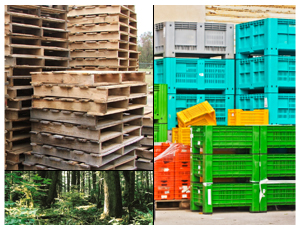Wood pallets - the truly green option
Plastic-pallet makers will tell you that using plastic pallets reduces deforestation and the associated landfill of used and broken wooden pallets
This is simply not true.
In the United States there are now more trees than at any time in the last 70 years. And according to the Western Silvicultural Contractor's Association, who promote the proper management of forest eco systems in Western Canada, over 280 million seedlings were planted in British Columbia in 2006-that's more than the combined annual planting of Finland, Norway, Sweden and Denmark.
As for landfill, the wood pallets that are in a landfill do not need to be there. Even the most damaged wooden pallets can be recycled into mulch, compounds used in the  production of particle board, bio-mass to fuel and heat manufacturing plants or drive machinery.
production of particle board, bio-mass to fuel and heat manufacturing plants or drive machinery.
Meanwhile, how much plastic are you likely to see in a landfill? One plastic bottle could take 1,000 years to decompose.
Even if plastic pallets are made from recycled plastic, think about the process that created the plastic in the first place. Plastic (high-density polyethylene or HDPE) is formed during a process called cracking. The process involves heating petroleum to an extreme temperature and causing the production of ethylene gas. The gas molecules join together to form polyethylene.
It's hardly an environmentally friendly process. Toxins are released into the air, and let's not forget the petroleum that's required in the process. It's estimated that around four per cent of the planet's petroleum supplies are used to make plastic every year. And there's a pretty toxic process that takes place to refine petroleum from crude oil, too.
Trees on the other hand help to protect us by absorbing Co2 and releasing oxygen.
And when a tree is harvested, every part of it is used to produce something that benefits us. From lumber used to frame houses, lay down as wood flooring or build furniture, to paper, rayon clothing (from wood cellulose) and shoe polish-from the bark. Even the dust accumulated from sawn lumber is collected and used in a variety of applications.
For pallets, which are vital necessity in shipping and contribute to the smooth running of the world's export markets, wood is the only sensible option.
L.C.N. is among the largest pallet manufacturers in North America, with an annual production capacity of over two million pallets. Our expertise and high-tech manufacturing allows us to offer competitive rates while meeting the industry's highest standards. L.C.N. was North America's first company to offer heat treatment pallet for assembled pallets.
http://www.bcclimatechange.ca/bc-global-leader-in-forest-management/deforestation-reforestation.aspx
http://www.gov.bc.ca/fortherecord/reforestation/re_economy.html?src=/economy/re_economy.html